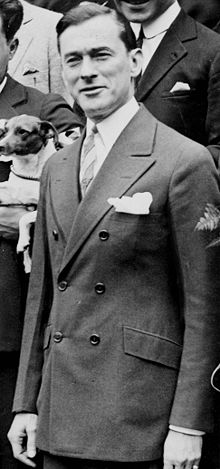James J. Walker
| Jimmy Walker | |
|---|---|
 |
|
| Mayor of New York City | |
|
In office January 1, 1926 – September 1, 1932 |
|
| Preceded by | John F. Hylan |
| Succeeded by | Joseph V. McKee |
| Member of the New York Senate from the New York County, 13th district |
|
|
In office January 1, 1919 – December 31, 1925 |
|
| Preceded by | James D. McClelland |
| Succeeded by | John J. Boylan |
| Member of the New York Senate from the New York County, 12th district |
|
|
In office January 1, 1915 – December 31, 1918 |
|
| Preceded by | Jacob Koenig |
| Succeeded by | Elmer F. Quinn |
| Member of the New York State Assembly from the New York County, 5th district |
|
|
In office January 1, 1910 – December 31, 1914 |
|
| Preceded by | John T. Eagleton |
| Succeeded by | Maurice McDonald |
| Personal details | |
| Born |
James John Walker June 19, 1881 New York City, New York, United States |
| Died | November 18, 1946 (aged 65) New York City, New York, United States |
| Political party | Democratic |
| Spouse(s) | Janet Walker Betty Compton (1933–1941; divorce) |
| Religion | Roman Catholic |
James John Walker, often known as Jimmy Walker and colloquially as Beau James (June 19, 1881 – November 18, 1946), was mayor of New York City from 1926 to 1932. A flamboyant politician, he was a liberal Democrat and part of the powerful Tammany Hall machine. During a corruption scandal he was forced to resign.
Walker was the son of Irish-born William H. Walker (1842–1916), a carpenter and lumberyard owner who was very active in local politics as a Democratic assemblyman and alderman from Greenwich Village, belying certain accounts of Walker's childhood that stated he grew up in poverty. Walker was not the best of students and dropped out of college before eventually graduating from New York Law School in 1904. Walker's father wanted him to become a lawyer and politician. Walker at first decided that he would rather write songs and be involved in the music industry but he eventually entered politics in 1909 and subsequently passed the bar exam in 1912.
Walker was a member of the New York State Assembly (New York Co., 5th D.) in 1910, 1911, 1912, 1913 and 1914. He was a member of the New York State Senate from 1915 to 1925, sitting in the 138th, 139th, 140th, 141st (all four 13th D.), 142nd, 143rd, 144th, 145th, 146th, 147th and 148th New York State Legislatures (all seven 12th D.); and was Minority Leader from 1920 to 1922; Temporary President of the State Senate from 1923 to 1924; and Minority Leader again in 1925. In the Senate he heavily opposed Prohibition.
...
Wikipedia
